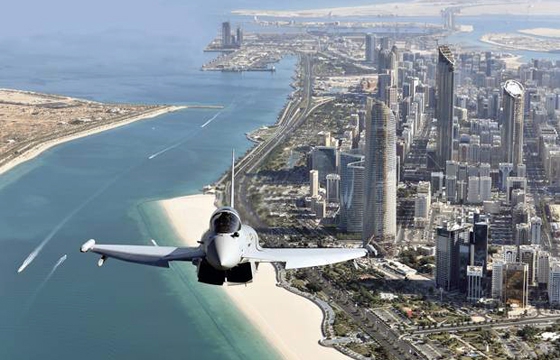In an effort to diversify its economy and increase employment opportunities for its growing population, Abu Dhabi is encouraging development in its downstream industrial sectors, with an emphasis on the aerospace industry.
Alongside a succession of recent contracts, the emirate is increasingly looking to promote itself as an international aerospace manufacturing and assembly hub.
However, challenges remain in developing the industry’s base, in particular ensuring that there is a substantial workforce able to meet the demands of original equipment manufacturers, particularly in terms of critical parts and maintenance requirements.
Votes of confidence
A series of high-profile commitments this year suggest a vote of confidence from some of the largest global aerospace players, with a growing shift beyond maintenance, repair and overhaul (MRO) activities into more assembly and supply.
In July Abu Dhabi-based investment and development company Mubadala Development Company’s subsidiary, Strata Manufacturing, signed contracts totalling $1bn with France’s Airbus to supply composite parts for the company’s small and medium-sized aircraft, as well as provide horizontal tailplanes for the A320 and inboard flaps for the A350-900, according to press reports.
The deal follows a $250m agreement inked in May of last year that made Strata the sole supplier of aileron assemblies for Airbus’ A330 program.
The same month, Strata signed a multi-year contract to manufacture vertical fins for US-based Boeing’s 787 Dreamliner, part of a 2013 agreement between Boeing and Mubadala Development Company to supply up to $2.5bn in advanced composites components and aerostructures for Boeing commercial programs. Strata is Boeing’s first direct composites supplier in the Gulf.
Additional deals spearheaded by Mubadala Development Company aim to further expand the scope and complexity of manufacturing in the emirate.
In mid-2016, for example, Cytec Solvay Group, a Belgium-based advanced composite and adhesive materials supplier for the aerospace industry, announced a 50:50 joint-venture (JV) partnership with Mubadala to supply carbon-fiber pre-impregnated composite materials to support Boeing’s 777 aircraft. The JV is expected to be operational by 2021.
The year-to-date has also seen local players, including Sanad Aero Solutions, SR Technics, and Turbine Services and Solutions, continue to expand their work around MRO and asset financing.
Nibras Al Ain
Most aerospace investments in Abu Dhabi are centered in Nibras Al Ain Aerospace Park, a 25-sq-km plot of land being developed jointly by Mubadala Development Company and Abu Dhabi Airports Company.
Located in Al Ain City, the park consists of industrial projects, businesses, office complexes and mixed-used residential zones, with 5 sq km reserved specifically for the aerospace industry and aimed at both Mubadala Aerospace’s existing network of assets, as well as international investors.
“The infrastructure provided as well as the clustering model around anchor tenants, such as Advanced Military Maintenance Overhaul and Repair Centre (AMMROC) and Strata, at Nibras will have a positive impact in terms of attracting investors to support the establishment of a sustainable aerospace hub,” Fahed Al Shamesi, CEO of AMMROC, a local defense MRO company, told OBG.
While Strata continues to expand its facilities in Al Ain, other strategic players are also expressing interest in the destination.
Earlier this year Mubadala Development Company and Rolls-Royce announced the details of an approved maintenance center (AMC), confirming plans to manufacture aeroplane engine components at a new facility.
The AMC in Al Ain is expected to have capacity to service 150 engines a year and will be operational by 2021, while the new manufacturing facility to build parts for Trent engines is expected to come on-line by 2018, according to a July statement from Mubadala Development Company.
The center should help support the expanding Middle Eastern market, which accounts for 25% of all orders for Trent XWB engines. The engines power the A350 Airbus, which is operated by the region’s growing aircraft fleets.
The workforce
Aerospace development is part of Abu Dhabi’s long-term vision of becoming a knowledge-based economy, as well as a key driver for employment going forward, with Mubadala Aerospace targeting 10,000 new jobs in the sector by 2030.
“Just like any other manufacturing business, the challenge remains in attracting enough engineering and technical talent to sustain our ambitions for growth,” Badr Al Olauma, CEO of Strata, told OBG.
“Manufacturing parts is not as difficult as developing a young workforce to design parts or industrialize a new manufacturing process.”
To address these targets, higher educational institutions have risen to the forefront through a number of private sector partnerships and doctoral specializations in aerospace engineering and robotics.
Established in 2007 and fully owned by the Abu Dhabi government, Khalifa University has played a key role in including the local population in the aerospace workforce. The university maintains partnerships with over 20 corporations and private bodies, which have been critical to the development of its expansive portfolio of research facilities.
Since 2012 the university has housed the Aerospace Research and Innovation Centre, which trains students in collaboration with Boeing, Airbus and GE. The facilities are laboratory-focused, aimed at enhancing the university’s research capabilities, with aerospace remaining a key area of interest of the institution.
Oxford Business Group
15 November
























































